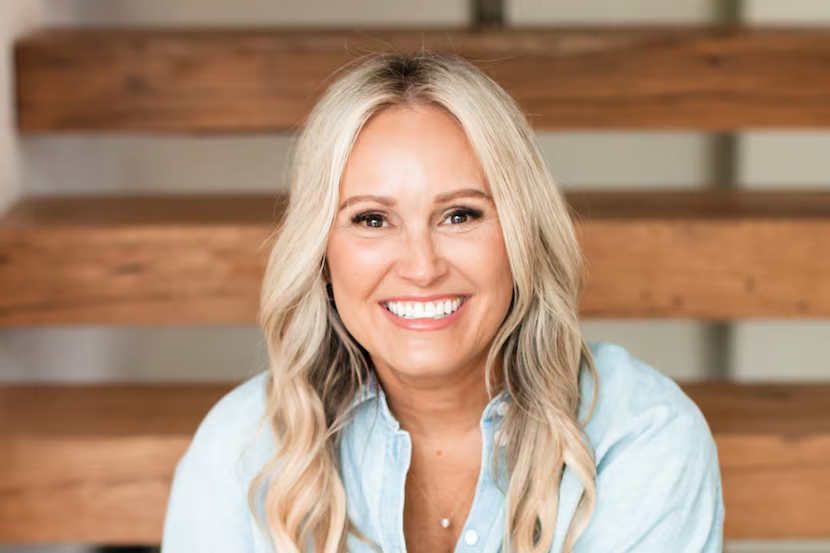With God as My Walking Stick — Nicole O'Meara
Tactile paving is my nemesis. Those yellow plates of bumps at the edge of a crosswalk or sidewalk were created to alert visually impaired people of an upcoming hazard, like a ramp or bicycle lane. I appreciate that. I’m so glad someone invented bumps that help, but for me, those bumps are a hazard!

I wobble around with a cane and a leg brace resembling a toddler more than I’d like. While I’m in the house, I usually walk without my cane. If I get tippy, there’s always a chair, table, or wall nearby to grab. We have smooth floors so that the foot that drags is less likely to catch on something. Inside the house, I feel safe. But outside, that’s different. Outside, there are all kinds of things I must think about, even if I don’t want to: uneven sidewalk edges, loose gravel, curbs, slopes, running children, and the distance to the next bench or place to rest. I miss the good ol’ days of walking without thinking about walking.
I was leaving a coffee date with my girlfriends the first time I fell outside. I only had to walk a few steps from the coffee shop to my car, but in between was a plate of tactile paving. Those yellow bumps reached out and grabbed my gimpy foot. Ok, they didn’t need to reach, my foot drags on its own. On that day, it dragged and caught one of the bumps, and down I went. My cane (which I wasn’t holding tightly) flew to the left, my journal flew to the right, and my hands took the brunt of the fall. I ended up with a few minor scrapes and a seriously bruised ego.
I learned a lesson that day: my cane is my friend, hold tightly.
Now, when I come to a plate of tactile paving, I step a little more carefully and grip my cane a little more tightly. The only thing that might prevent a fall if I trip is my cane, which makes it valuable to me. It’s a boring, generic black tube of aluminum—nothing special except that it gives me the freedom to walk, especially where there are no railings or other solid structures to hold on to. That makes my cane precious to me. I don’t begrudge it; I appreciate it.
I thought about my cane recently when I read Jeremiah 1:11-12. The way it’s phrased in The Message tickled me:
God’s Message came to me: “What do you see, Jeremiah?”
I said, “A walking stick—that’s all.”
And God said, “Good eyes! I’m sticking with you.
I’ll make every word I give you come true.”
If I met Jeremiah, I wouldn’t be surprised to find he has a dry sense of humor. “What do you see?” . . . “A stick.” He spoke the truth, and that’s all. I imagine he might have thought, “It’s a stick. What’s so special about that?” Maybe he rolled his eyes. But he didn’t sass God. He just said exactly what he observed and kept his opinions to himself.
And God ran with it.
I think God might have elaborated like this: Yep, it’s a stick alright. And what are sticks good for? Walking! They keep you steady on your feet. And goodness, how far you can go with a little help from a walking stick. Oh, and by the way, I’m gonna be your walking stick. I’ll hold you up when you stumble a bit. I’ll give you the strength to walk a little farther. That way, you can take my message far and wide. Yes, sir-ee, with me, you’ll succeed. So hold on tight.
As I’ve been reading Jeremiah, I’ve been thinking about this walking stick illustration. Jeremiah had a tough message, and it wasn’t well received. How tightly he must have held onto God, his walking stick, his guide, and his strength.
When I see a yellow plate of tactile paving ahead, I grip my cane a bit tighter, and I thank God for the ability to walk, the ability he gave me. But now, with God’s words to Jeremiah echoing in my mind, “I’m sticking with you,” I think I’ll watch for tactile paving as a reminder of God’s presence with me. He’s sticking with, always.
I love sending my subscribers special goodies straight to their inbox, like this list of 12 Verses to Help You Endure.
I’d love to send it to you.
Featured
Often, real change happens in small increments that we may not notice. This is true for physical healing as well as spiritual healing. Becoming more like Christ happens in one moment (salvation) and in a lifetime of moments (sanctification). It is the work of the Holy Spirit who is constantly healing and shaping our hearts, but if we’re not careful, we’ll miss it entirely.
No wonder the Bible repeatedly commands us to “remember,” “remind,” and “write down” the faithful deeds of the Lord.
We need the kind of rest that renews and restores. Rest when our feet ache at the end of a long day, and rest when our heart breaks for a dear friend. Rest when we need grace for ourselves, and rest when someone needs grace from us. We need rest that heals. This is the rest Jesus offers when He said, “Come to me, all who labor and are heavy laden, and I will give you rest” (Matthew 11:28).
I am now the keeper of a set of 100-year-old wedding rings. They are the oldest possessions in my care, and I feel the weight of their history.
The Holy Spirit reminds me that I possess a truth much older and much more valuable. I do not know the monetary value of my great-grandmother’s rings but I know the truth of the gospel is priceless. Matthew 13:46 tells me the Kingdom of Heaven is like a priceless pearl: “When he found one of great value, he went away and sold everything he had and bought it” (NIV).
For as long as my lungs have bled, I have wanted a doctor with enough wisdom to explain why my body continues to grow bad blood vessels and how to stop it from growing more.
On the other side of human limits we find hope in the infinite strength and wisdom of God. Where man’s abilities end we can find a new beginning — to trust “in the name of the Lord our God.”
Vascular Ehlers-Danlos Syndrome. Say that three times fast. It’s the name of the condition I carry deep in my genetic code. Maybe you carry the weight of a hard-to-say, even-harder-to-explain rare disease. Maybe your diagnosis isn’t even named yet and you’re in a frustrating cycle of doctors’ visits, tests, and endless waiting. With all of the appointments and daily management of our disease, we can easily let these identifications become our identity.
Our rare disease can take up a lot of our time, but it must not take preeminence in our hearts.
The hard task of climbing is good for me. I intentionally choose the challenge of climbing because I trust that it is good for me and I desire the results. Most days, I don’t look forward to the challenge but I love the “I’m alive!” feeling I get after the climb.
I feel the same way about reading God’s Word. Tempting thoughts come every day as I sit down to read and I must shove them aside and choose the challenge of focusing, reading, and listening. My reward is the feeling of intimacy with God I get during those times. I never regret the effort.
I struggle with asking why. It feels like a form of complaining or faithlessness. Are my whys a lack of trust in God who I know to be Sovereign over all, always good, never changing, loving, compassionate, and faithful? My friend’s death taught me I had more to learn about my God.
There are no rules to this growing-in-community thing. It can look different in each friendship circle. Jesus set the example with his disciples. He called them his “brothers” (Matthew 12:49, NIV). They met for prayer, for meals, and for ministry.
There were days when the best I could do was make my own coffee and walk to the mailbox. On those days, I learned to worship God and serve him with the smallest bits of energy I had. Those were days of training. Not training for a marathon. I'll tell you straight up, this body will never run a marathon. No, those days were training for days when I would have more energy, more health. I learned to steward my body for kingdom work. No matter how broken, my body will always be good enough for the work God has prepared for me. Today, I have the privilege of sharing how God gave me a new perspective on my healthy body at (in)courage.















